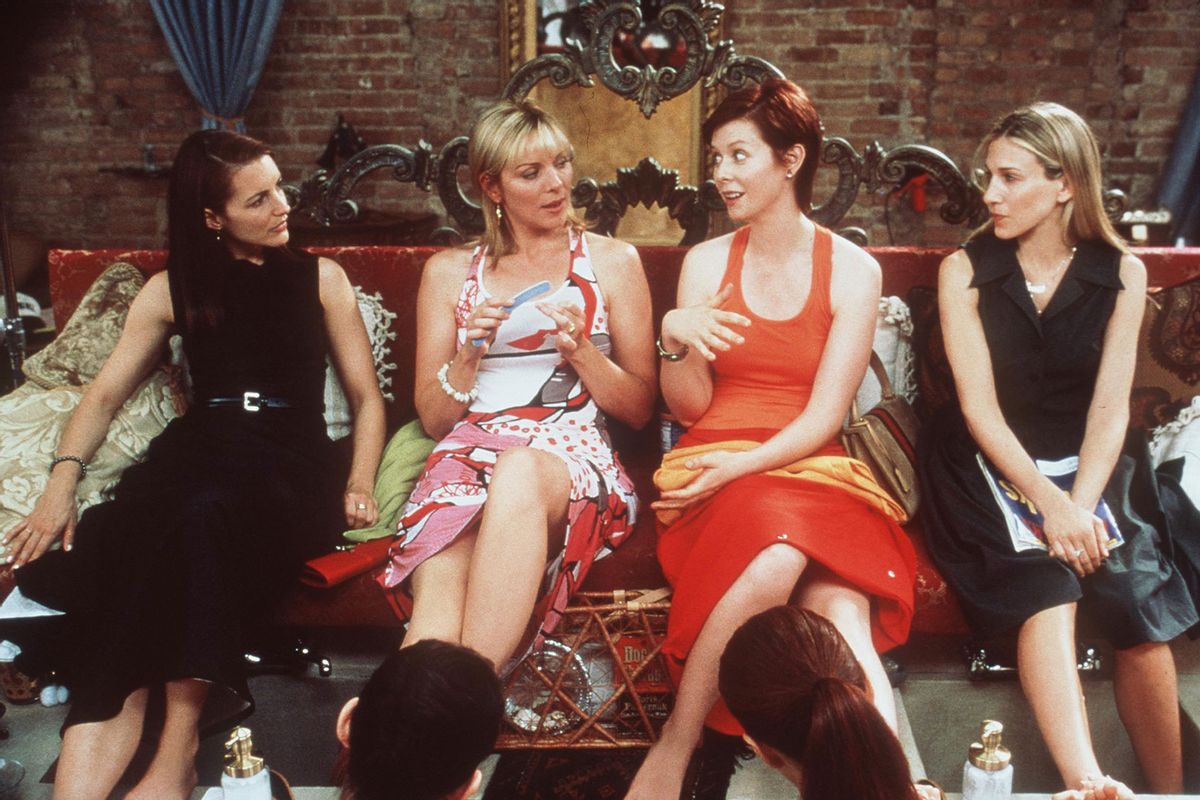Gen Z is calling out Carrie, Miranda, Samantha and Charlotte’s collective awfulness – but they’re missing the point.

The cast of “Sex And The City”: Kristin Davis, Kim Cattrall, Cynthia Nixon and Sarah Jessica Parker.
Sex and the City” will never die. In 1998, it made juggernauts out of stars Sarah Jessica Parker, Kim Cattrall, Cynthia Nixon and Kristin Davis. The female pleasure-centered show broke boundaries as it showcased four white women in their 30s reveling in their privileged lives, which focused on shopping, lunching together and having casual sex with men.
In the series, Carrie Bradshaw (Parker) is the hopeless romantic who runs a sex column titled “Sex and the City,” Samantha Jones (Cattrall) is the sex-positive public relations agent, Miranda Hobbes (Nixon) is the ambitious corporate lawyer gunning for partner and Charlotte York (Davis) is the traditional aspiring homemaker who doubles as an art dealer.
Instead of trying to fix or reimagine what’s cringe and awful about the show’s characters and writing, we are missing the show’s value in women’s media.
On the surface, the main characters are nothing like me. Inherently, my personal experiences as a working-class daughter of African immigrants who lives in Brooklyn, shouldn’t relate to the stories of Carrie, Samantha, Miranda and Charlotte – but they do.
The HBO classic has been available to stream on Max but recently found its way to Netflix, which has led to the show finding a new audience in Gen Z, who are rediscovering the 26-year-old show.
In a viral piece in the Independent, 22-year-old journalist Brittany Miller admitted that upon her first watch of some of the show’s episodes, she was not a fan. Miller said her issues with the show aren’t contingent on its how it’s aged, but rather that it’s “unbearably cringey” and centers on characters who are “awful people – and awful friends.”
As a 24-year-old writer living in NYC, I cannot speak for the totality of Zoomers. However, I can say in defense of “Sex and the City” that instead of trying to fix or reimagine what’s cringe and awful about the show’s characters and writing, we are missing the show’s value in women’s media.
Most of this criticism begins and ends with Carrie. She is your textbook unlikeable protagonist: a self-absorbed main character who serves as a mirror to our own worst impulses. Some of her most selfish tendencies are ones we see in real life. Have you ever wrapped your self-worth in romantic relationships that bring you nearly zero validation? If not, you definitely have a friend who has. Her longtime love interest Mr. Big (Chris Noth) treats her with as much self-respect as she has for herself. In the middle of Season 2, she finds out he is going to Paris and hasn’t told her. Later, she wears a beret and brings McDonald’s to show him she wants to move to Paris for him. He tells her “I don’t want you to uproot your life and expect anything.” She yells at him but mostly at herself while throwing her Filet-o-Fish, “I’m such an idiot!”
In Season 3, she meets her next boyfriend, the furniture designer Aidan Shaw (John Corbett). It doesn’t take long before she cheats on Aidan with Big while Big is married to a younger, more socially acceptable woman Natasha (Bridget Moynahan). Just as it started, the affair ends disastrously with Aidan heartbroken and Natasha with a literal broken nose. Early in the show’s run, Carrie’s reckless relationship decisions may have felt isolated to only harming herself. But as the show progresses, it smartly depicts her choices as hurtful to people she cares about too — a human realization that we are all subject to learning as we get older.
I’m not here to excuse any of Carrie’s bad behavior, but rather, as writer Kyndall Cunningham argues in a piece for Vox, “Does it matter if Carrie Bradshaw is the worst?” The hate she may receive may be fair but it’s overstated. Carrie came before characters like Tony Soprano, Walter White, Dexter Morgan and Don Draper. We certainly don’t fault them for their bad decision-making skills — we exalt them.
If we are to compare any of the “Sex and the City” characters to men, Samantha emulates the type of feminism that blossomed in the ’90s and ’00s. With the scales between men and women tipping towards equality, author Ariel Levy explains in “Female Chauvinist Pigs: Women and the Rise of Raunch Culture” that in a hyper-sexual post-’90s America, many women performed their sexuality boldly, brashly for male pleasure. They did this as a way to gain status from the dominant group and overcome oppression by acting like male chauvinists.
There are parts of this that are true for Samantha. The fan favorite is the most sexually liberated on the show. But she is also emotionally unavailable to most of her love interests. She is an interesting foil to Carrie and Charlotte, the show’s traditional romantics. She does that by unapologetically expressing and flaunting her sexual fluidity and openness. Sometimes her unapologetic nature is violently problematic as she picks a fight with Black transgender sex workers who work outside her apartment building. But her character arc shines in the last season of the show. Her vulnerability peeks through her facade as she loses her hair during her chemotherapy treatments. Her healthy, long-term relationship with Smith (Jason Lewis) illustrates the character’s growth when she cries to him about her hair, and he shaves his head to match hers.
As a product of its time, “Sex and the City” exists to reflect our worst and best selves – and we need to acknowledge both sides.
For Charlotte, love and relationships drive her motivations. She looks for love and commitment in almost every relationship. She was a WASPy tradwife before that term was coined on social media. Christian influencers like Estee Williams, Cynthia Loewen, Natalie Bennett and Mrs. Midwest, come to mind. Even though this imagery may be harmful to portray to its audience, for how much it plays into patriarchal expectations, ultimately, she pays the price for her staunchly traditional ways. Her dedication to securing a husband and having children before society declares her a spinster leaves her in a passionless, sexless marriage with the uber-perfect Trey (Kyle MacLachlan). Ultimately, she gets divorced because of their incompatibility. She meets her soulmate in a dopey, divorce attorney, named Harry (Evan Handler), and he’s imperfectly imperfect for her.
Unlike Charlotte, Miranda’s ambition and hard-line realism are another tool to keep viewers’ feet planted on the ground. But mostly, Miranda is career-focused and self-reliant, the most modern working woman out of the bunch. However, as dedicated as she is to her work, she struggles to find real romantic connections because of her rigid standards. That is until she meets the unlikely working-class bartender Steve (David Eigenberg). The on-again-off-again relationship opens up Miranda’s one-track mind. Love makes her slightly more vulnerable but it also gives her the chance to be a mother. When she has her son, Brady, Miranda learns the importance of community and leaves her hyper-independence at the door.
As the show nears its end, writer Charlie Squire illustrates in the blog Evilfemale that “the main characters are punished for their shortcomings.” Each character is reprimanded for their awfulness, making sure that even if they aren’t perfect, politically correct women — they are real. As a product of its time, “Sex and the City” exists to reflect our worst and best selves – and we need to acknowledge both sides. In a world where right-wing politicians are actively scrubbing America’s stains of slavery from our memories in schools, whitewashing our troubled histories is detrimental and regressive. It takes well-intentioned efforts to be better, and looking back is a large part of that.
So it is limiting to write off “Sex and the City” as a problematic relic we should leave behind. When in reality, we should learn from its faults and triumphs. If rewriting history has taught us anything in our ever-polarizing political and social spheres, the criticism about “Sex and the City” would not have resulted in the inauthentic changes in its spinoff “And Just Like That.” Instead, “Sex and the City” would be a piece of history we cherish for its importance so we can do better.





